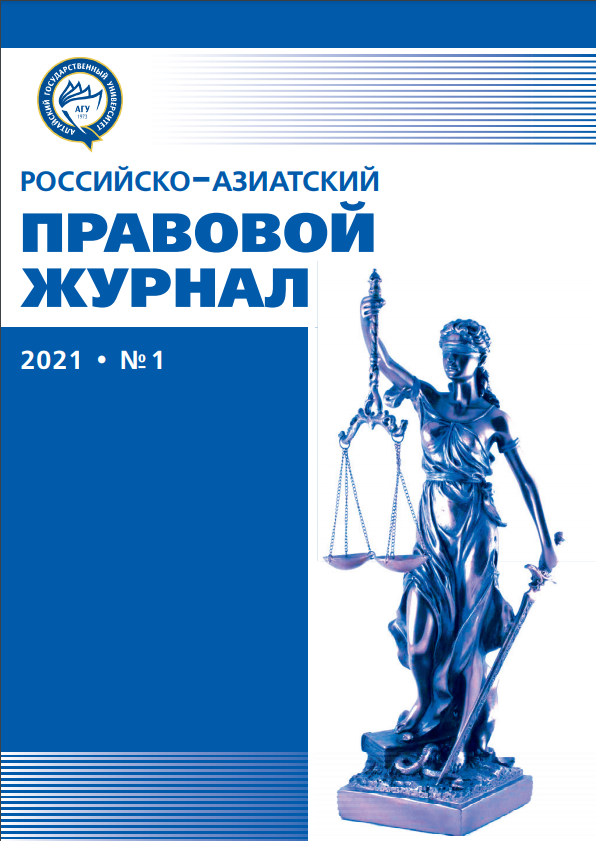REPLACEMENT OF A SUSPENDED SENTENCE WITH ACTUAL IMPRISONMENT IN CASES OF CRIMES IN THE FIELD OF BUSINESS AND OTHER ECONOMIC ACTIVITIES
УДК 343.24 ББК 67.408
Abstract
The article deals with the possibility of abolishing the conditional sentence for real imprisonment forpersons who have committed so-called entrepreneurial crimes. The theme is of particular relevance at thebeginning of 2021, so as only legal replacement of conditional imprisonment for real has become one of themost discussed in the press in connection with the detention of media policy, calling himself the opposition ofRussia. At the beginning of the study, the author defines the system-forming features of the category “crimesin the sphere of entrepreneurial and other economic activities”. Further, the procedural and substantiveaspects of the replacement of a suspended sentence are considered. The author comes to the conclusionthat it is possible to apply, by analogy, the criminal procedure legislation regulating the procedural issues ofreplacing punishments that are not related to deprivation of liberty with a more severe type of punishmentdue to the lack of a special provision in the penal enforcement legislation on the possibility of forciblybringing and detaining a person conditionally convicted if there are grounds for assigning a real punishment.The author also considers the content component of such a category of cases and comes to the conclusionthat a systematic approach is necessary when issuing a relevant judicial act on the actual anti-legal postcriminal behavior of a convicted person.
Downloads
References
2. Судебная статистика. URL: http://stat.апи-пресс. рф/stats/ug/t/14/s/17 (дата обращения: 08.02.2021 г.).
3. Урман А. Как наказывают за экономические преступления в России и других странах. URL: https://secretmag.ru/trends/scenarios/kak-za-odni-i-te-zhe-ekonomicheskie-prestupleniya nakazyvayutv-rossii-i-drugih-stranah. htm (дата обращения: 07.02.2021).
4. О практике применения судами законодательства об исполнении приговора : Постановление Пленума Верховного суда РФ от 20.12.2011 №21 // Российская газета. №296. 30.12.2011.
5. Шеслер А.В. Отзыв официального оппонента о диссертации Сутурина М.А. «Обязательные работы в отношении несовершеннолетних», представленной на соискание ученой степени кандидата юридических наук по специальности 12.00.08 «Уголовное право и криминология; уголовно-исполнительное право», г. Томск // Вестник Кузбасского института ФСИН России. 2012. №4. С. 97–99.
6. Плашевская А.А. Уголовно-исполнительное задержание в системе мер правового принуждения // Вестник Кузбасского института ФСИН России. 2012. №3 (11). С. 51–55.
7. Селиверстов В.И. Перспективы развития уголовно-исполнительного законодательства Российской Федерации // Международный пенитенциарный журнал. 2015. №1. С. 17–19.
Russian-Asian Law Journal is a golden publisher, as we allow self-archiving, but most importantly we are fully transparent about your rights.
Authors may present and discuss their findings ahead of publication: at scientific conferences, on preprint servers, in public databases, and in blogs, wikis, tweets, and other informal communication channels.
Russian-Asian Law Journal allows authors to deposit manuscripts (currently under review or those for intended submission) in non-commercial, pre-print servers such as ArXiv.
Authors who publish with this journal agree to the following terms:
- Authors retain copyright and grant the journal right of first publication with the work simultaneously licensed under a Creative Commons Attribution License that allows others to share the work with an acknowledgement of the work's authorship and initial publication in this journal.
- Authors are able to enter into separate, additional contractual arrangements for the non-exclusive distribution of the journal's published version of the work (e.g., post it to an institutional repository or publish it in a book), with an acknowledgement of its initial publication in this journal.
- Authors are permitted and encouraged to post their work online (e.g., in institutional repositories or on their website) prior to and during the submission process, as it can lead to productive exchanges, as well as earlier and greater citation of published work (See The Effect of Open Access).








